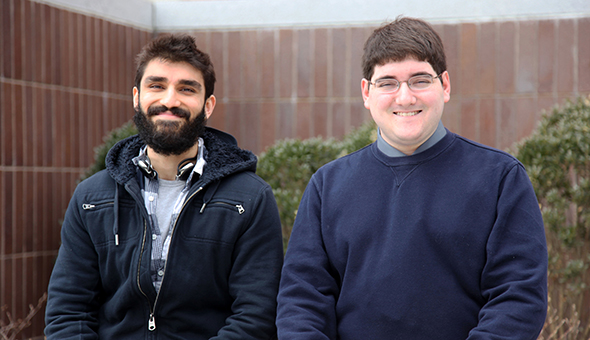Two Dartmouth students have their sights set on very different kinds of science, courtesy of the National Science Foundation (NSF). As recipients of NSF Graduate Research Fellowships, Eshin Jolly will pursue graduate studies in cognitive neuroscience at Dartmouth while Aryeh Drager '12 will head to Colorado State University to study atmospheric science.
Eshin Jolly (left) and Aryeh Drager '12 are winners of prestigious NSF Graduate Research Fellowships. (Photo by Corinne Arndt Girouard)
"It is a pretty prestigious thing to have bestowed upon you your first couple of years of grad school," Jolly says. "I think it is an investment that the government and the other faculty and people in the field are making in you because they hopefully see something in you." Jolly was born in New Delhi, India. “But I grew up on Long Island, N.Y., and have lived my entire life there," he says.
"I am pretty excited," says Drager. “The NSF fellowship offers additional research flexibility and opens the door to collaborations that would not otherwise be possible. My main research focus will be tropical convection”—the science of vertical movement in the atmosphere, where layers of air rise and fall, leading to phenomena such as thunderstorms. "It has implications for global climate, as well as applications to the study of hurricanes."
Drager, a native of West Hartford, Conn., is currently a teaching assistant at Thayer School of Engineering. "Under the guidance of Professor Miles Blencowe [physics and astronomy] I effectively quadruple minored in engineering, physics, earth science, and applied math," he says. His proposal to the NSF fellowship program was an extension of work he did as a summer intern at Colorado State, where he analyzed data from CloudSat, an experimental satellite that uses radar to observe clouds and precipitation from space.
Jolly, who describes his fellowship as "pretty awesome," is a first-year graduate student in the Department of Psychological and Brain Sciences, where he works with Professor Thalia Wheatley.
"I study what is called social cognitive neuroscience," he says. "It is basically using functional brain imaging and the statistical modeling of the imaging data to help us understand social phenomena, such as how we come to understand other people's minds, their feelings and intentions." His fellowship proposal was for "an investigation of the neural basis of the self and in particular whether patterns of brain activity represent some sort of self that exists even when we are not actively thinking about or consciously evaluating ourselves."
Drager and Jolly are among more than 13,000 who submitted applications for the 2013 NSF Graduate Research Fellowship competition. Of these, 2,000 received award offers. In addition, six Dartmouth students were accorded honorable mentions:
- Emma Chiappetta, mathematical sciences—geometric analysis
- Annie Putman, earth sciences—polar atmospheric
- Priyanka Nadar, Thayer School of Engineering at Dartmouth—biomedical
- Megan Vakiener '12, social sciences—biological anthropology
- Kenneth Baclawski '12, social sciences—linguistics
- Cristina Herren '12, life sciences—ecology
Gabriella Pardee of the University of Toledo, another NSF Graduate Research Fellowship recipient, will become a graduate student in Dartmouth's Department of Biological Sciences.
According to the NSF, "The Graduate Research Fellowship Program is the country's oldest fellowship program directly supporting graduate students in the science, technology, engineering and mathematics (STEM) fields. In operation almost as long as NSF itself, the program makes an investment in students with demonstrated potential for significant achievements in science and engineering."
The new fellows, who join 14 current Dartmouth students who are previous fellowship recipients, will each receive three years of support, including a $30,000 annual stipend and a $12,000 cost-of-education allowance to the institution.
Additional current Dartmouth students who are NSF Graduate Fellows
- Ashley Corbett, earth sciences—paleoclimate
- Vivek Venkataraman, ecology
- Eric Reavis, cognitive neuroscience
- Sean Guillory, cognitive neuroscience
- Maria Hindt, molecular biology
- Christine Urbanowicz, ecology
- Sarah Wolff, mathematical sciences—algebra or number theory
- Robert Chavez, cognitive neuroscience
- Alex Schlegel, cognitive neuroscience
- Thomas Kraft, biological anthropology
- Anna Hatch, cell biology
- Beth Reinke, evolutionary biology
- Amy Baker, molecular biology
- Alexandra Giese, earth sciences—glaciology

